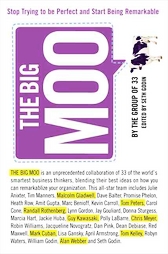Jacobs Media clients recently received an advance, uncorrected proof, of a cool new book called "The Big Moo," edited by Seth Godin. It’s the product of 33 marketing gurus who volunteered their work for three charities. Notably, none of the articles is attributed, so you can read them without the bias of knowing precisely who wrote what.
 As promised in an earlier blog, we’re going to devote several blog entries to some of our favorite "Moo’s." An early one, "Everything Is Free," openly wonders how most business would fare if they were forced to follow the Public Radio model. Those of us in commercial radio know that drill. Yes, while Public Radio airs their form of advertising (known as "underwriting announcements"), the majority of their funding comes from extracting money from their customers.
As promised in an earlier blog, we’re going to devote several blog entries to some of our favorite "Moo’s." An early one, "Everything Is Free," openly wonders how most business would fare if they were forced to follow the Public Radio model. Those of us in commercial radio know that drill. Yes, while Public Radio airs their form of advertising (known as "underwriting announcements"), the majority of their funding comes from extracting money from their customers.
How would your station perform under those circumstances? Have you curried enough favor from listeners? Have you truly served them well? Do you offer them compelling programming to the point where they’d pay to continue hearing it?
We may sneer at how XM and Sirius are hemorrhaging money as they grow, but the fact is that in the not-so-distant future, their entire survival will depend on subscriptions. They are clearly proceding with that pressure in mind, working hard to develop hard-to-duplicate programming.
We cannot predict the future of terrestrial radio, of course, but "Everything Is Free" asks whether we treat our customers like family, whether we involve them in our programming, and what we’d have to do with our product in order to persuade our audience to pay for it. Good questions all.
If you’d like to buy copies of "The Big Moo," go to www.thebigmoo.com. Here’s the article, "When Everything Is Free":
WHEN EVERYTHING IS FREE
Washington, D.C. 2010, April —(AP) Spiraling price competition from China, India, Wal-Mart, and Internet programmers is driving prices down to their lowest levels in one hundred years, the U.S. Commerce Department said yesterday.
Based on data it has collected, the Commerce Department issued an extraordinary warning: U.S. businesses should consider changing their business models to a donation-based system or face highly uncertain prospects, including Chapter 7 bankruptcy. In a related story, bankruptcy filings readied record levels last week…
Right now, the article above is a science-fiction story. Maybe a really bad one. But imagine if price competition played out to its ultimate end: Everything is free.
Or virtually free.
What if your company’s business model was like that of public broadcasting?
That is, all of your products are free. You only earn revenue by convincing customers to donate money that represents their value of your product.
What if your company’s business model was like that of public broadcasting?
That is, all of your products are free. You only earn revenue by convincing customers to donate money that represents their value of your product.
More than one thousand public radio and television stations in the United States operate this way every year. Many public broadcasters thrive, too. Average public-radio-station revenue is at its highest levels in years. National Public Radio is the fastest-growing radio format. In her will, Joan Kroc, a loyal NPR listener, left NPR $200 million when she died in 2003. It’s not just the rich patrons that care, though. More than 25,000 people were so upset with a personality change on NPR that they signed an online petition within days. To get 25,000 people to sign anything is a feat in itself. Passionate attachment to public broadcasting is at an all-time high, supplemented by monetary donations and the volunteerism of customers who keep public broadcasters on the air.
A public-broadcasting business model could be creeping up on your company faster than you care to imagine or admit.
Severe price pressure is a growing reality for manufacturers of furniture, software, and electronics, as well as providers of call centers, accounting, and oilier white-collar jobs that can be accomplished by anyone with enough training. Perhaps a public-broadcasting business model isn’t such a far-fetched scenario after all. A model that relies on donations and is based on free seems alien, but maybe that’s the best route for the future of your organization.
For a moment, imagine that within a year global competition causes your company to rely on donations to survive. How will you prepare? How will you change your relationship with customers? Will you change at all?
Will you begin to treat customers like family? Will you involve them in the business, as many family-owned businesses do? I low will you attract and keep customers who will chip in extra money if you can’t meet your yearly revenue goals?
How will you change your product to become so valuable that customers will pay a fair price after they’ve used it freely for a year?
What will you do differently to survive?
-From "The Big Moo" Edited by Seth Godin (p6)
- A 2020 Lesson?It Could All Be Gone In A Flash - April 24, 2025
- How AI Can Give Radio Personalities More…PERSONALITY - April 23, 2025
- Can Radio Afford To Miss The Short Videos Boat? - April 22, 2025




Leave a Reply